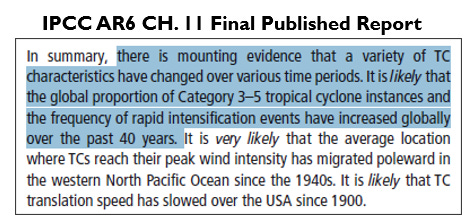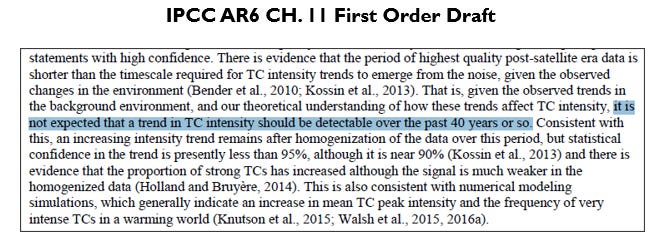A Tip from an IPCC Insider
Confirmation of a major error and a pointer to a peer review failure

Everyone makes mistakes. They can even creep into high level assessments of the Intergovernmental Panel on Climate Change (IPCC). Scientific integrity is not about being perfect, but self-correction. Can the IPCC recognize and correct mistakes? We shall see, because mistakes have been made.
A high level participant in the IPCC (purposely vague to protect their identity) has confirmed to me that the major error on tropical cyclones that I recently identified was (a) indeed a major snafu and (b) a result of claims being inserted into the IPCC outside its review process. Neither of these things should happen in an process that the IPCC promotes as the “gold standard” of scientific assessment.
The error was to claim that a change in the proportion of Category 3-5 tropical cyclones has been detected and attributed to human-caused climate change, which is contrary to both evidence and the scientific literature. Even worse, in making the false claims the IPCC confused a study of measurements of tropical cyclones with tropical cyclones, and failed to acknowledge that paper had undergone a major correction (Update: See Greg Kent in the comments below with further eye-opening details on this correction. Greg is the person who called the errors to the authors’ attention).
The false claim was not caught and was ultimately elevated by the IPCC to the summary of its recent Synthesis Report where it was promoted as one of the most significant scientific findings of the past assessment cycle. You can read all of the details on the error in this post and its follow up.
The tip that I received prompted me to go back and look carefully at the evolution of the drafting of IPCC AR6, which was where the mistake made. I can confirm that the tip checks out. The IPCC failed to follow its own procedures of quality control and peer review. False information made its way into the report outside of the review process and was repeatedly elevated to the highest levels of information conveyed to policy makers. Let’s take a look — the evidence is undeniable.
Below is the relevant discussion of tropical cyclone intensities in the First Order Draft (FOD) of IPCC AR6 Chapter 11 (hereafter, just Ch.11, and in the images below I have added the highlighting).
Here is the key passage:
“given the observed trends in the background environment, and our theoretical understanding of how these trends affect TC intensity, it is not expected that a trend in TC intensity should be detectable over the past 40 years or so”
This statement on the challenges of detection on time scales as short as 40 years is scientifically accurate and consistent with the conclusions of past IPCC reports and the broad scientific literature. It remains an accurate statement.
IPCC “drafts” are just that and go out for review and comment. Following the review of the FOD a Second Order Draft was published which softened the conclusion of the FOD on detectability and introduced a reference to Kossin et al. 2020 (who happened to be a co-author of the Chapter — self-citations are a problem for IPCC, but I digress). The figure below shows the new, more nuanced text.
The new text says that a trend over the past 40 years or so “might become detectable” and noted that the significance of the increase in “TC exceedence probability” was “marginal.” All of this is to say — the added nuance further confirms that there is not much evidence in the literature being assessed for detection or attribution related to trends in tropical cyclone intensities.
Here is where things get interesting.
The Final Government Distribution draft of Ch.11 removed all of the nuanced text acknowledging the weak case for detection and the “marginal” significance of a study of tropical cyclone measurements (and not TCs directly). Strangely, newly added was a strong conclusion that was unsupported by the text, the word “likely” shows up and “marginal” disappears in its claim that the “proportion of major TC intensities” had increased over the past 40 years.
The language here is awkward as “major TC intensities” are not the same thing as “major tropical cyclones.” It is understandable how a non-expert might confuse or misunderstand this terminology — But of course, the IPCC is supposed to be written by world-leading experts, so confusion about the science is not excusable.
This language was further changed by the time the report was finalized, as you can see below, with tropical cyclone “intensities” being changed to tropical cyclone “instances” — which is actually not a concept used in the literature.

The vocabulary used to describe tropical cyclone intensities was further changed in the WG1 Summary for Policy Makers which stated:
“It is likely that the global proportion of major (Category 3–5) tropical cyclone occurrence has increased over the last four decades . . .”
Now the word used was “occurrence.” This is exactly the sort of error that peer review is supposed to catch. Unfortunately, the false claim was apparently never actually subject to peer review at any stage in the process, or else it might have been caught and corrected.
The IPCC participant who tipped me off to the error indicated that it had occurred because the report was changed outside of the review process. The evidence above indicates that my tipster was correct.
The IPCC started with scientifically accurate statement about detection and attribution related to tropical cyclone intensities and this statement was at first clarified in the review process. But then the accurate and nuanced statement was removed, and in its place a false claim was inserted and expressed with confidence. This is not how assessments are supposed to work.
This week a group in Netherlands — called CLINTEL, which expresses openly skeptical view of climate science and policy — has published a report which asserts and seeks to document that there are many such errors in the recent IPCC report. I have read their report and I can confirm that in my areas of expertise, there is considerable merit in their claims of errors of commission and omission (more on that to come).
If past is prologue, the CLINTEL report will be met with shouts of “denier” and ignored by the IPCC community. That would be a mistake. Of course opposition groups often participate with zeal in the so-called extended peer review community. The issue here is not the motivations or politics of CLINTEL, but whether they — as I have here — documented meaningful errors in the recent IPCC reports. It appears that they have, and more than just a few.
Errors happen. Scientific integrity means that when errors are identified, they are corrected and the processes that allowed them to slip in are fixed. The IPCC is too important to be doing poor quality work. The ball is in their court.
Comments welcomed. So too are tips from insiders. Please share and subscribe!







This is a success of peer review, not a failure. Peer review guarantees adherence to fashionable orthodoxy. That's all it does. Here it worked as intended.
Roger, I think your strategy of staying narrowly focused on scientific integrity will win the day, eventually. I do think you’re threading a needle though. For example, one of the authors of the CLINTEL report is Andy May, who in 2022 stated, "There is no evidence, other than models, that human CO2 emissions drive climate change and abundant evidence that the Sun, coupled with natural climate cycles, drives most, if not all, of recent climate changes". Which, of course, makes him a denier in the current mainstream. And in that current narrative it means you are quoting the work of climate change deniers.
Stay independent, for the win!